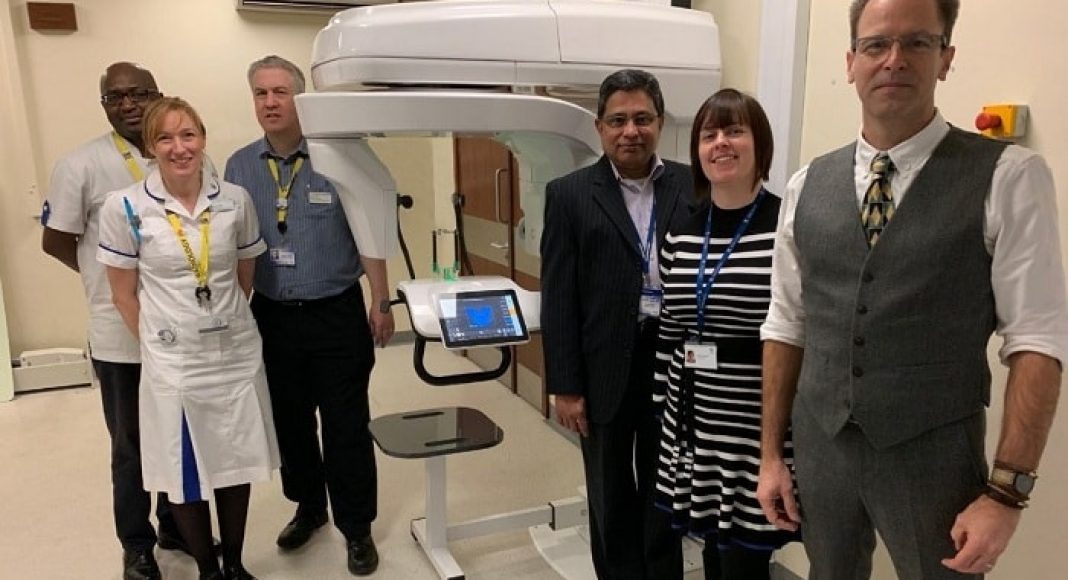The world’s newest head & neck cone beam computed tomography (CBCT) scanner, featuring patented Metal Artefact Reduction, a 120kV generator and the very latest advances in radiographer assistance, has been installed at Leicester Royal Infirmary (LRI).
Installation of the Carestream CS 9600 CBCT at LRI was facilitated by their long-term vendor-independent managed service provider Althea, working in partnership with Hulbert Dental ICT – UK sector specialist for Carestream Dental.
LRI is the first UK hospital to introduce the technology after being chosen as the only site worldwide, to undertake clinical verification of this new CBCT platform, specifically targeted around medical sector requirements.
As an important evolution on established dental CBCT systems, the CS 9600 allows clinicians to scan more than just teeth or MaxFacs regions, adding approval for Cervical Spine and Scaphoid imaging. Output images are automatically transferred to PACS along with user-defined recons, all in DiCOM format. The CS 9600 can also perform straightforward 2D OrthoPanTomograms and it even remembers the individual patient demographics, further improving workflow for follow-up imaging.
The CS 9600 Cone Beam CT scanner has similar geometry and footprint to an OPT machine, maximising the use of increasingly limited real-estate. For many images the radiation dose to the patient is a fraction of that of a multi-slice CT scanner and it is quicker to use, reducing the patient visit from as much as 15 minutes, to around 5 minutes in total.
LRI was chosen specifically to put the machine through its paces in performing large volume CT scans of the Sinuses, Temporal bones and Skull Base. The scanner’s minimum voxel size of 75 microns gives these examinations superb image resolution. The new scanner will be used in the diagnosis and planning of Oral and ENT surgery, as well as the re-direction of a sizable proportion of its Sinus and Temporal Bone imaging from a busy conventional CT service, resulting in a Cost Improvement Plan with significant savings over the financial year.
Colin Ross, Radiology Site Manager, said “Before the CS9600, we were using the CS9300. We really liked the CS9300, but the CS9600 has many advantages over it. The CS9600 is very easy to use with patient positioning being particularly intuitive. The CS9600 also has a maximum KvP of 120 rather than 90 and offers significantly larger Fields Of View.”
Service Medical Lead Dr Ram Vaidhyanth, said “The high-resolution mode combined with small field of view is ideal for temporal bone imaging. Metal artefact reduction algorithm is very useful in both dental and sinus imaging.”
Tony Hulbert, Director at HULBERT Dental ICT, commented on the experience: “It has been a great pleasure to work with the team at LRI throughout the validation process, with much credit due to the radiographers and radiologists in Balmoral Xray. It is thanks to their positive and valuable feedback, that we take the CS 9600 forward with great confidence in what could well be a tipping-point in the application of CBCT technology.”
Althea is the world’s largest, vendor-independent managed service and maintenance provider for the acute healthcare sector. The company delivers a Managed Equipment Service (MES) to UK and Ireland hospitals such as the University Hospitals of Leicester update and improve their technology whilst managing the day-to-day concerns of running a department. This includes maintenance and breakdowns and on-going replacements throughout the term of the contract.
David Rolfe, UK&I Chief Executive Officer, added “We spend a huge amount of time with clinicians at LGH to understand how their department works, what their clinicians require, the procedures they undertake and what all of this means for the future. Being entirely vendor-independent ensures Althea is not tied to any one manufacturer and can offer hospitals the most efficient solution for their clinical needs.”


















